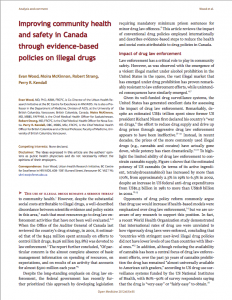 Dr. Perry Kendall of British Columbia and Dr. Robert Strang of Nova Scotia call for evaluation of alternative strategies to reduce unwanted harms incurred by current approach to illicit drugs
Dr. Perry Kendall of British Columbia and Dr. Robert Strang of Nova Scotia call for evaluation of alternative strategies to reduce unwanted harms incurred by current approach to illicit drugs
Vancouver, British Columbia (March 28, 2012): Two Canadian chief provincial medical health officers have highlighted discordance between scientific evidence and drug policy decision‐making, and endorsed a discussion of new approaches, including the evaluation of taxation and regulation strategies as a more effective way to improve community health and safety in Canada.
The BC Centre for Excellence in HIV/AIDS (BC‐CfE) today published a paper in Open Medicine, an international, peer‐reviewed medical journal reviewing the evidence on the effectiveness of current illicit‐drug policies. The opinions expressed in the paper by the authors are their own professional opinions as public health physicians and do not necessarily reflect the opinions of their employers.
The paper focuses on cannabis and concludes: “In light of the persistently widespread availability and relative safety of cannabis in comparison to existing legal drugs, as well as the crime and violence that exist secondary to prohibition of this drug, there is a need for discussion about the optimal regulatory strategy to reduce the harms of cannabis use while also reducing unintended policy‐attributable consequences (e.g., the organized crime that has emerged under prohibition).”
The paper recommends that the Canadian government re‐evaluate strategies such as mandatory minimum sentences, which have proven costly and ineffective in other nations. It notes that a growing number of European countries, such as Portugal and Holland, have treated drug use as a health rather than a criminal justice issue and have seen lower rates of drug use, as well as lower rates of drug‐related harms such as HIV infections, overdose deaths, and crime.
“There is clear evidence to demonstrate that the so called war on drugs has not achieved its stated objectives of reducing rates of drug use or drug availability,” said Dr. Perry Kendall, chief provincial medical health officer for B.C. and co‐author of the paper. “There are alternative approaches that have proved more effective in protecting public heath while not enriching organized crime and driving gang violence.”
Dr. Evan Wood, co‐director, Urban Health Research Initiative at the BC‐CfE and one of the co‐authors of the paper said that in the face of overwhelming evidence that the war‐on‐drugs approach is ineffective, the status quo must change if we really want to effectively counter the harms of illicit drugs and work towards creating safer communities for our children.
There has been growing support for regulation and taxation of marijuana in B.C. and the debate for drug policy reform has been gaining momentum across Canada. Earlier this year, Canada’s Liberal party voted in favour of the resolution to tax and regulate marijuana citing the failure of the war‐on‐drugs strategy. Recently, in B.C., former Vancouver mayors, premiers and provincial attorneys general have spoken out in favour of taxation and regulation of marijuana.
“Canada needs to pause and re‐evaluate its current approach to drug policy and embrace evidence‐ based strategies that can meaningfully improve community health and safety,” said Dr. Robert Strang, chief provincial medical health officer for Nova Scotia and co‐author of the paper.
To read the full paper titled Improving community health and safety in Canada through evidence‐based policies on illegal drugs, please go to: http://www.openmedicine.ca/.
[button link=”http://www.openmedicine.ca/article/view/501/455/” color=”orange”]Click Here for Paper[/button]
About the British Columbia Centre for Excellence in HIV/AIDS
The BC Centre for Excellence in HIV/AIDS (BC‐CfE) (www.cfenet.ubc.ca) is Canada’s largest HIV/AIDS research, treatment and education facility and is internationally recognized as an innovative world leader in combating HIV/AIDS and related diseases. It is based at St. Paul’s Hospital, Providence Health Care, a teaching hospital of the University of British Columbia. The BC‐CfE works in close collaboration with key provincial stakeholders, including health authorities, health care providers, academics from other institutions, and the community to improve the health of British Columbians living with HIV through developing, monitoring and disseminating comprehensive research and treatment programs for HIV and related illnesses.
For additional information or to request an interview, please contact:
Mahafrine Petigara
Edelman (for BC‐CfE)
604‐623‐3007 ext. 297
[email protected]
